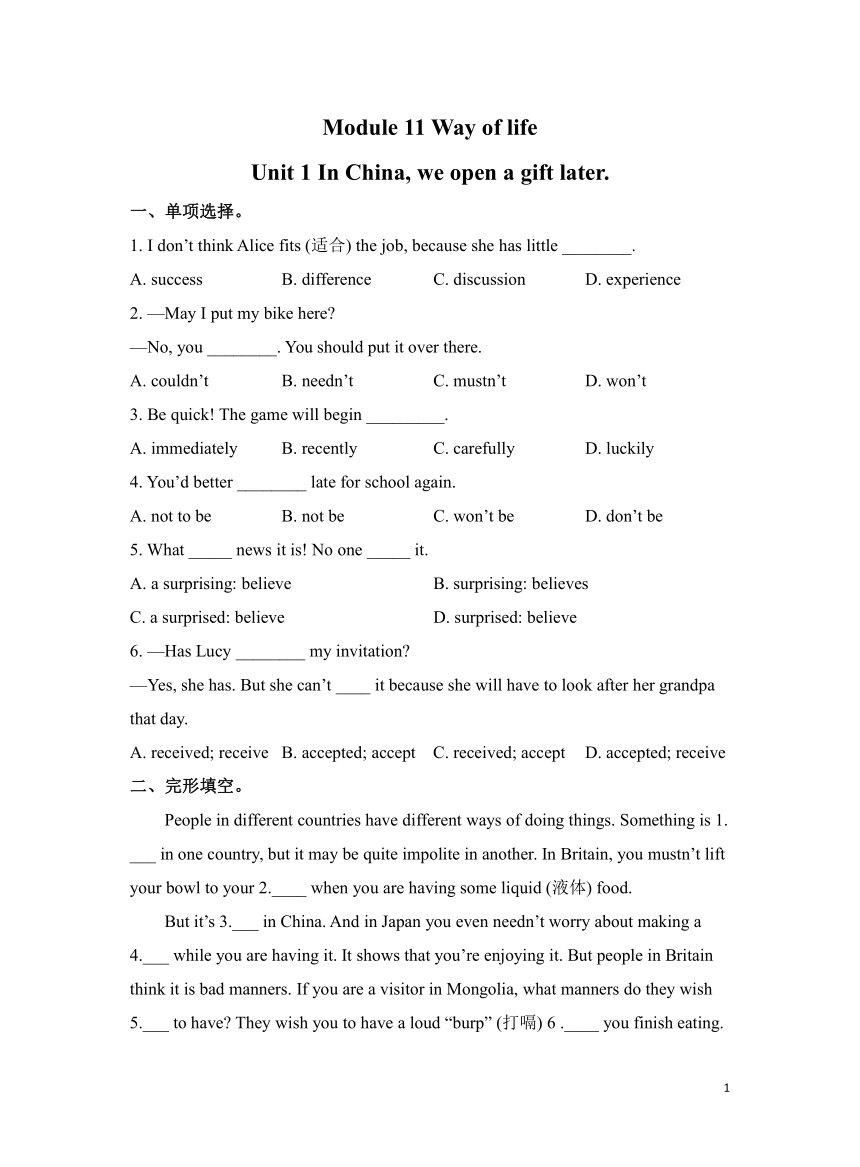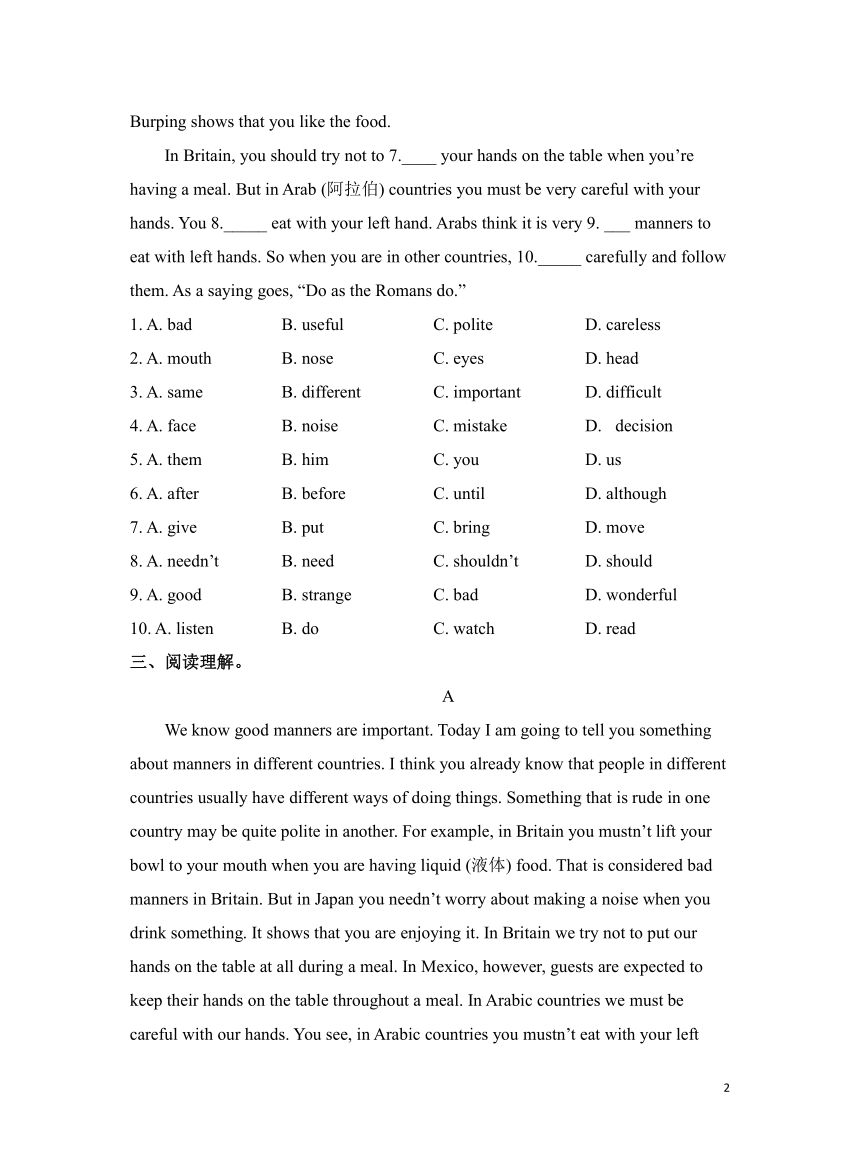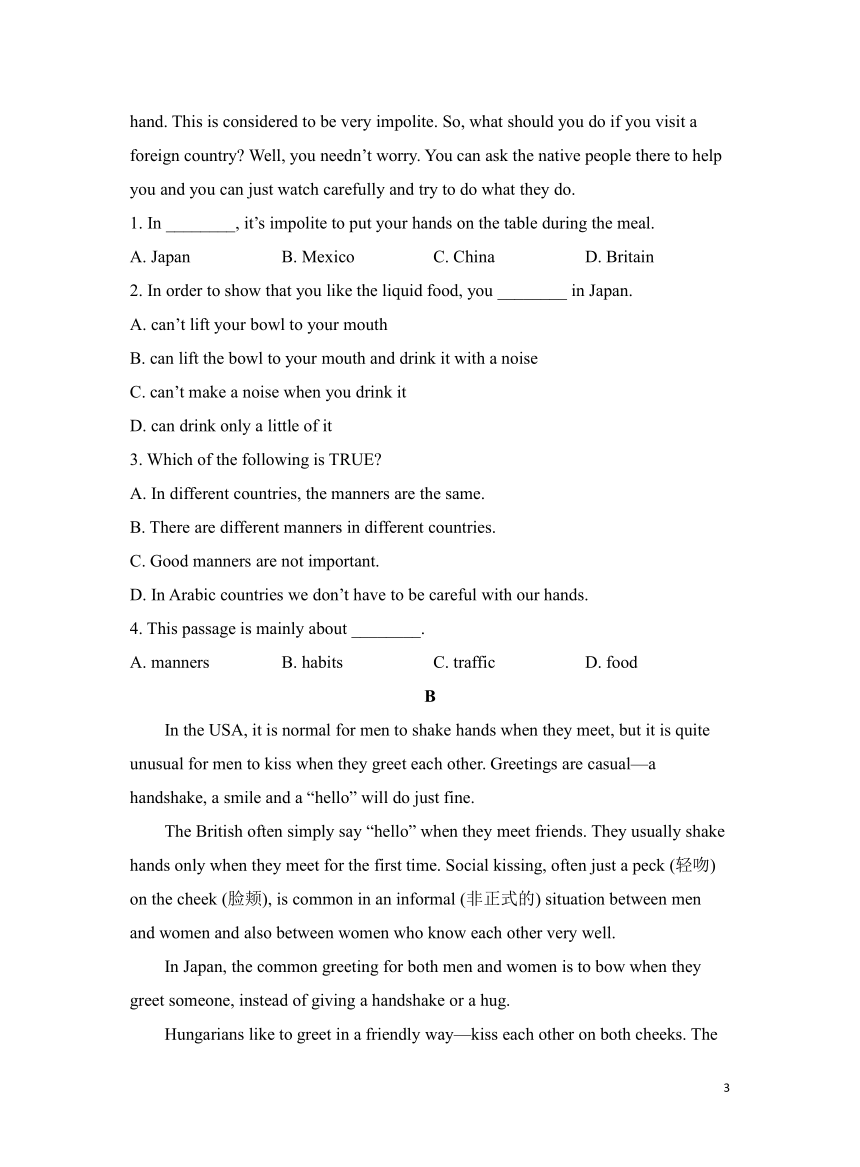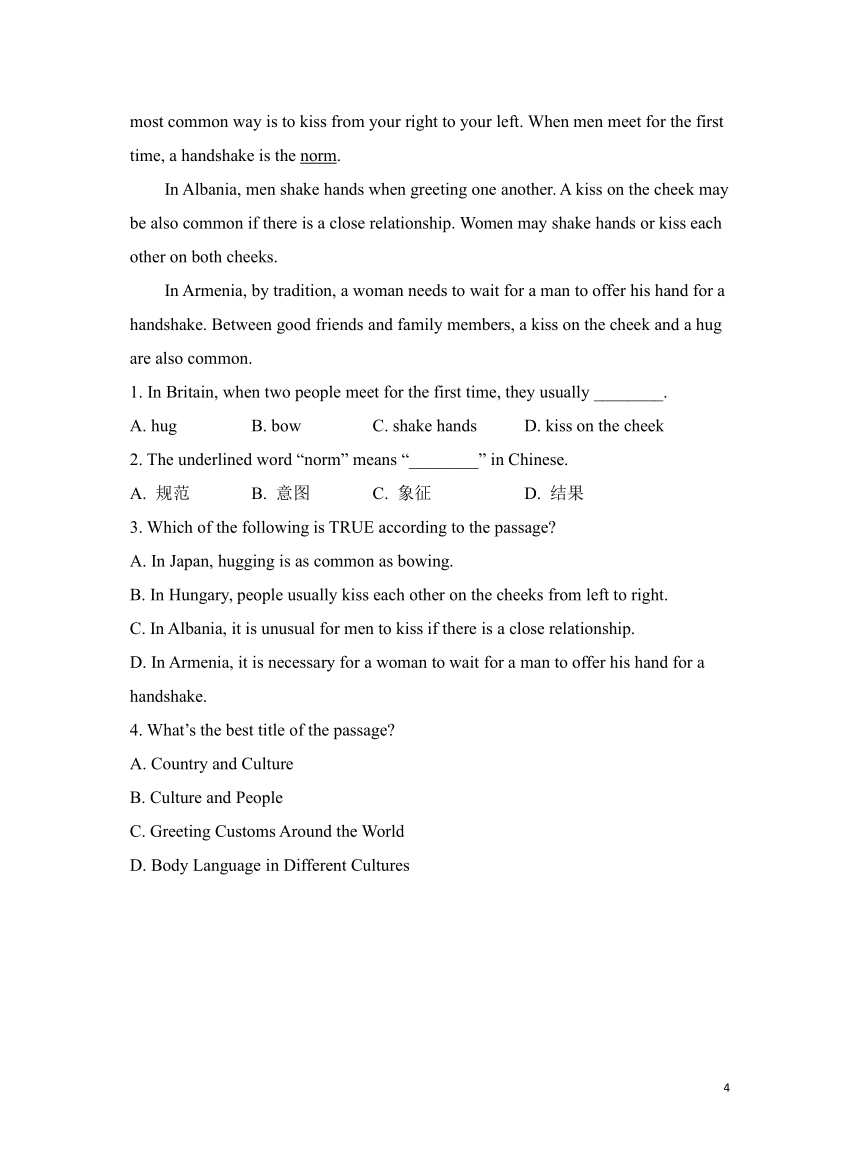初中英语外研版八上Module 11 Way of life Unit1作业(含解析)
文档属性
| 名称 | 初中英语外研版八上Module 11 Way of life Unit1作业(含解析) |  | |
| 格式 | docx | ||
| 文件大小 | 22.4KB | ||
| 资源类型 | 教案 | ||
| 版本资源 | 外研版 | ||
| 科目 | 英语 | ||
| 更新时间 | 2023-08-30 17:22:44 | ||
图片预览




文档简介
Module 11 Way of life
Unit 1 In China, we open a gift later.
一、单项选择。
1. I don’t think Alice fits (适合) the job, because she has little ________.
A. success B. difference C. discussion D. experience
2. —May I put my bike here
—No, you ________. You should put it over there.
A. couldn’t B. needn’t C. mustn’t D. won’t
3. Be quick! The game will begin _________.
A. immediately B. recently C. carefully D. luckily
4. You’d better ________ late for school again.
A. not to be B. not be C. won’t be D. don’t be
5. What _____ news it is! No one _____ it.
A. a surprising: believe B. surprising: believes
C. a surprised: believe D. surprised: believe
6. —Has Lucy ________ my invitation
—Yes, she has. But she can’t ____ it because she will have to look after her grandpa that day.
A. received; receive B. accepted; accept C. received; accept D. accepted; receive
二、完形填空。
People in different countries have different ways of doing things. Something is 1. ___ in one country, but it may be quite impolite in another. In Britain, you mustn’t lift your bowl to your 2.____ when you are having some liquid (液体) food.
But it’s 3.___ in China. And in Japan you even needn’t worry about making a 4.___ while you are having it. It shows that you’re enjoying it. But people in Britain think it is bad manners. If you are a visitor in Mongolia, what manners do they wish 5.___ to have They wish you to have a loud “burp” (打嗝) 6 .____ you finish eating. Burping shows that you like the food.
In Britain, you should try not to 7.____ your hands on the table when you’re having a meal. But in Arab (阿拉伯) countries you must be very careful with your hands. You 8._____ eat with your left hand. Arabs think it is very 9. ___ manners to eat with left hands. So when you are in other countries, 10._____ carefully and follow them. As a saying goes, “Do as the Romans do.”
1. A. bad B. useful C. polite D. careless
2. A. mouth B. nose C. eyes D. head
3. A. same B. different C. important D. difficult
4. A. face B. noise C. mistake D. decision
5. A. them B. him C. you D. us
6. A. after B. before C. until D. although
7. A. give B. put C. bring D. move
8. A. needn’t B. need C. shouldn’t D. should
9. A. good B. strange C. bad D. wonderful
10. A. listen B. do C. watch D. read
三、阅读理解。
A
We know good manners are important. Today I am going to tell you something about manners in different countries. I think you already know that people in different countries usually have different ways of doing things. Something that is rude in one country may be quite polite in another. For example, in Britain you mustn’t lift your bowl to your mouth when you are having liquid (液体) food. That is considered bad manners in Britain. But in Japan you needn’t worry about making a noise when you drink something. It shows that you are enjoying it. In Britain we try not to put our hands on the table at all during a meal. In Mexico, however, guests are expected to keep their hands on the table throughout a meal. In Arabic countries we must be careful with our hands. You see, in Arabic countries you mustn’t eat with your left hand. This is considered to be very impolite. So, what should you do if you visit a foreign country Well, you needn’t worry. You can ask the native people there to help you and you can just watch carefully and try to do what they do.
1. In ________, it’s impolite to put your hands on the table during the meal.
A. Japan B. Mexico C. China D. Britain
2. In order to show that you like the liquid food, you ________ in Japan.
A. can’t lift your bowl to your mouth
B. can lift the bowl to your mouth and drink it with a noise
C. can’t make a noise when you drink it
D. can drink only a little of it
3. Which of the following is TRUE
A. In different countries, the manners are the same.
B. There are different manners in different countries.
C. Good manners are not important.
D. In Arabic countries we don’t have to be careful with our hands.
4. This passage is mainly about ________.
A. manners B. habits C. traffic D. food
B
In the USA, it is normal for men to shake hands when they meet, but it is quite unusual for men to kiss when they greet each other. Greetings are casual—a handshake, a smile and a “hello” will do just fine.
The British often simply say “hello” when they meet friends. They usually shake hands only when they meet for the first time. Social kissing, often just a peck (轻吻) on the cheek (脸颊), is common in an informal (非正式的) situation between men and women and also between women who know each other very well.
In Japan, the common greeting for both men and women is to bow when they greet someone, instead of giving a handshake or a hug.
Hungarians like to greet in a friendly way—kiss each other on both cheeks. The most common way is to kiss from your right to your left. When men meet for the first time, a handshake is the norm.
In Albania, men shake hands when greeting one another. A kiss on the cheek may be also common if there is a close relationship. Women may shake hands or kiss each other on both cheeks.
In Armenia, by tradition, a woman needs to wait for a man to offer his hand for a handshake. Between good friends and family members, a kiss on the cheek and a hug are also common.
1. In Britain, when two people meet for the first time, they usually ________.
A. hug B. bow C. shake hands D. kiss on the cheek
2. The underlined word “norm” means “________” in Chinese.
A. 规范 B. 意图 C. 象征 D. 结果
3. Which of the following is TRUE according to the passage
A. In Japan, hugging is as common as bowing.
B. In Hungary, people usually kiss each other on the cheeks from left to right.
C. In Albania, it is unusual for men to kiss if there is a close relationship.
D. In Armenia, it is necessary for a woman to wait for a man to offer his hand for a handshake.
4. What’s the best title of the passage
A. Country and Culture
B. Culture and People
C. Greeting Customs Around the World
D. Body Language in Different Cultures
参考答案与解析
一、单项选择。
1. D
【解析】句意:我认为爱丽丝不适合这份工作,因为她没有什么经验。考查名词辨析。A. success成功;B. difference不同,差异;C. discussion讨论;D. experience经验,经历。结合句意可知选D。
2. C
【解析】句意:——我可以把自行车放在这儿吗?——不,你不能。你应该把它放在那边。
考查情态动词。A. couldn’t不能,过去式;B. needn’t不必,不需要;C. mustn’t不能,禁止;D. won’t将不。May I ... 是征求意见或许可的句型。它的肯定回答:1) Yes, you can/may. 2) Of course (you can). 3) Sure. 4) Yes, please. 它的否定回答:1) No, you can’t / mustn’t. 2) I’m afraid you can’t. 3) You’d better not. 注:否定回答不能用No, you may not. 结合句意和选项可知选C。
3. A
【解析】句意:快点!这个节目马上就要开始了。
考查副词辨析。immediately立刻,直接地;recently最近;carefully仔细地;luckily幸运地。根据句意可知, 表示”马上开始”,故选A。
4. B
【解析】句意:你最好不要再上学迟到了。短语had better (not) do sth.:最好(不)做某事;结合选项和句意可知选B。
5. B
【解析】句意:这是多么令人惊讶的消息啊!没有人相信。考查感叹句和谓语动词。What引导的感叹句构成:What+ (a/an)+形容词+名词+主语+谓语!;news:消息,不可数名词;surprised:惊讶的,惊奇的,觉得奇怪的,感觉意外的;指主观感受,一般作表语或宾语补足语,一般修饰人。surprising:令人惊讶的,指事物本身具有的特性,一般修饰物或事情。故第一句填surprising;不定代词作主语时,谓语动词一般使用单数;根据No one (没有人)不定代词可知谓语动词单数填believes;故选B。
6. C
【解析】句意:—露西收到我的请柬了吗?—是的,她收到了。但她不能接受,因为那天她必须照顾她的爷爷。考查动词词义辨析。received收到,receive invitation:收到邀请;accept接受,accept invitation接受邀请。结合句意和语境可知选C。
二、完形填空。
【解析】
1. C 下文中提到了“but it may be quite impolite in another”,由此可推断答案为C。
2. A 结合设空处后的“when you are having some liquid food”可推断,对应的身体部位是mouth。
3. B 但是在中国是不同的,故different符合题意。
4. B make a noise意为“制造噪音”。
5. C 和you相呼应的代词是you。
6. A 他们希望你吃完之后能打一个响亮的嗝。故答案为A。
7. B 在英国当你吃饭的时候你应该尽量不要把手放在桌子上,故put符合题意。
8. C 结合上下文可推断,你不应该用左手吃饭,故答案为C。
9. C 结合上文的描述可推断,用左手吃饭是很没有礼貌的,故答案为C。
10. C 所以当你在其他的国家时,认真观察他们,并跟着他们做。故所缺的词是watch。
三、阅读理解。
A篇【解析】本文说明礼节的重要性,说明不同国家有不同的礼节。
1. D细节理解题。从In Britain we try not to put our hands on the table at all during a meal.可知答案选D。
2. B. 细节理解题。In Britain you mustn’t lift your bowl to your mouth when you are having liquid (液体) food. That is considered bad manners in Britain. But in Japan you needn’t worry about making a noise when you drink something. It shows that you are enjoying it. 在英国,当你吃液体食物时,你不能把碗举到嘴里。在英国这被认为是不礼貌的。但在日本,你不必担心喝东西时会吵闹。这表明你很享受。故答案选B。
3. B本文介绍不同国家礼节不同,有时在这个国家是不礼貌的在别的国家受欢迎。故B正确。
4. A主旨大意题。本文说明礼节的重要性,说明不同国家有不同的礼节。主要介绍礼节问题。故答案选A。
B篇【解析】本文是一篇说明文,介绍了世界各国在问候礼节方面的不同风俗习惯。
1. C 題意:在英国,当两个人第一次见面时,他们通常会____。考查细节理解题。根据第二段第二句They usually shake hands only when they meet for the first time,可知选C。
2. A 题意:划线词"norm"在汉语中的意思是“______”。考查词义理解题。根据文意和本段段意,可知介绍的是匈牙利人惯常的社交方式,故选A。
3. D 题意:根据文章。下列哪一项是正确的?考查细节理解题。A. In Japan, hugging is as common as bowing. 在日本,拥抱就像鞠躬一样平常;根据In Japan, the common greeting for both men and women is to bow when they greet someone, instead of giving a handshake or a hug.可知说法错误。B. In Hungary, people usually kiss each other on the cheeks from left to right. 在匈牙利,人们通常从左到右亲吻脸颊;根据The most common way is to kiss from your right to your left.可知说法错误。C. In Albania, it is unusual for men to kiss if there is a close relationship. 在阿尔巴尼亚,如果有亲密的关系,男人亲吻是不寻常的;根据In Albania, men shake hands when greeting one another. A kiss on the cheek may be also common if there is a close relationships 可知说法错误。D. In Armenia, it is necessary for a woman to wait for a man to offer his hand for a handshake. 在亚美尼亚,一个女人需要等待一个男人伸出手来握手;根据In Armenia, by tradition, a woman needs to wait for a man to offer his hand for a handshake.可知说法正确。综合以上分析,故选D。
4. C题意:这篇文章最好的题目是什么?考查细节理解题。A. Countries and Cultures国家与文化;B. Cultures and People文化与人;C. Greeting Customs Around the World世界各地的问候风俗;D. Body Language in Different Cultures不同文化中的肢体语言。根据短文内容,可知介绍的是世界各国在问候礼节方面的不同风俗,故选C。
1
Unit 1 In China, we open a gift later.
一、单项选择。
1. I don’t think Alice fits (适合) the job, because she has little ________.
A. success B. difference C. discussion D. experience
2. —May I put my bike here
—No, you ________. You should put it over there.
A. couldn’t B. needn’t C. mustn’t D. won’t
3. Be quick! The game will begin _________.
A. immediately B. recently C. carefully D. luckily
4. You’d better ________ late for school again.
A. not to be B. not be C. won’t be D. don’t be
5. What _____ news it is! No one _____ it.
A. a surprising: believe B. surprising: believes
C. a surprised: believe D. surprised: believe
6. —Has Lucy ________ my invitation
—Yes, she has. But she can’t ____ it because she will have to look after her grandpa that day.
A. received; receive B. accepted; accept C. received; accept D. accepted; receive
二、完形填空。
People in different countries have different ways of doing things. Something is 1. ___ in one country, but it may be quite impolite in another. In Britain, you mustn’t lift your bowl to your 2.____ when you are having some liquid (液体) food.
But it’s 3.___ in China. And in Japan you even needn’t worry about making a 4.___ while you are having it. It shows that you’re enjoying it. But people in Britain think it is bad manners. If you are a visitor in Mongolia, what manners do they wish 5.___ to have They wish you to have a loud “burp” (打嗝) 6 .____ you finish eating. Burping shows that you like the food.
In Britain, you should try not to 7.____ your hands on the table when you’re having a meal. But in Arab (阿拉伯) countries you must be very careful with your hands. You 8._____ eat with your left hand. Arabs think it is very 9. ___ manners to eat with left hands. So when you are in other countries, 10._____ carefully and follow them. As a saying goes, “Do as the Romans do.”
1. A. bad B. useful C. polite D. careless
2. A. mouth B. nose C. eyes D. head
3. A. same B. different C. important D. difficult
4. A. face B. noise C. mistake D. decision
5. A. them B. him C. you D. us
6. A. after B. before C. until D. although
7. A. give B. put C. bring D. move
8. A. needn’t B. need C. shouldn’t D. should
9. A. good B. strange C. bad D. wonderful
10. A. listen B. do C. watch D. read
三、阅读理解。
A
We know good manners are important. Today I am going to tell you something about manners in different countries. I think you already know that people in different countries usually have different ways of doing things. Something that is rude in one country may be quite polite in another. For example, in Britain you mustn’t lift your bowl to your mouth when you are having liquid (液体) food. That is considered bad manners in Britain. But in Japan you needn’t worry about making a noise when you drink something. It shows that you are enjoying it. In Britain we try not to put our hands on the table at all during a meal. In Mexico, however, guests are expected to keep their hands on the table throughout a meal. In Arabic countries we must be careful with our hands. You see, in Arabic countries you mustn’t eat with your left hand. This is considered to be very impolite. So, what should you do if you visit a foreign country Well, you needn’t worry. You can ask the native people there to help you and you can just watch carefully and try to do what they do.
1. In ________, it’s impolite to put your hands on the table during the meal.
A. Japan B. Mexico C. China D. Britain
2. In order to show that you like the liquid food, you ________ in Japan.
A. can’t lift your bowl to your mouth
B. can lift the bowl to your mouth and drink it with a noise
C. can’t make a noise when you drink it
D. can drink only a little of it
3. Which of the following is TRUE
A. In different countries, the manners are the same.
B. There are different manners in different countries.
C. Good manners are not important.
D. In Arabic countries we don’t have to be careful with our hands.
4. This passage is mainly about ________.
A. manners B. habits C. traffic D. food
B
In the USA, it is normal for men to shake hands when they meet, but it is quite unusual for men to kiss when they greet each other. Greetings are casual—a handshake, a smile and a “hello” will do just fine.
The British often simply say “hello” when they meet friends. They usually shake hands only when they meet for the first time. Social kissing, often just a peck (轻吻) on the cheek (脸颊), is common in an informal (非正式的) situation between men and women and also between women who know each other very well.
In Japan, the common greeting for both men and women is to bow when they greet someone, instead of giving a handshake or a hug.
Hungarians like to greet in a friendly way—kiss each other on both cheeks. The most common way is to kiss from your right to your left. When men meet for the first time, a handshake is the norm.
In Albania, men shake hands when greeting one another. A kiss on the cheek may be also common if there is a close relationship. Women may shake hands or kiss each other on both cheeks.
In Armenia, by tradition, a woman needs to wait for a man to offer his hand for a handshake. Between good friends and family members, a kiss on the cheek and a hug are also common.
1. In Britain, when two people meet for the first time, they usually ________.
A. hug B. bow C. shake hands D. kiss on the cheek
2. The underlined word “norm” means “________” in Chinese.
A. 规范 B. 意图 C. 象征 D. 结果
3. Which of the following is TRUE according to the passage
A. In Japan, hugging is as common as bowing.
B. In Hungary, people usually kiss each other on the cheeks from left to right.
C. In Albania, it is unusual for men to kiss if there is a close relationship.
D. In Armenia, it is necessary for a woman to wait for a man to offer his hand for a handshake.
4. What’s the best title of the passage
A. Country and Culture
B. Culture and People
C. Greeting Customs Around the World
D. Body Language in Different Cultures
参考答案与解析
一、单项选择。
1. D
【解析】句意:我认为爱丽丝不适合这份工作,因为她没有什么经验。考查名词辨析。A. success成功;B. difference不同,差异;C. discussion讨论;D. experience经验,经历。结合句意可知选D。
2. C
【解析】句意:——我可以把自行车放在这儿吗?——不,你不能。你应该把它放在那边。
考查情态动词。A. couldn’t不能,过去式;B. needn’t不必,不需要;C. mustn’t不能,禁止;D. won’t将不。May I ... 是征求意见或许可的句型。它的肯定回答:1) Yes, you can/may. 2) Of course (you can). 3) Sure. 4) Yes, please. 它的否定回答:1) No, you can’t / mustn’t. 2) I’m afraid you can’t. 3) You’d better not. 注:否定回答不能用No, you may not. 结合句意和选项可知选C。
3. A
【解析】句意:快点!这个节目马上就要开始了。
考查副词辨析。immediately立刻,直接地;recently最近;carefully仔细地;luckily幸运地。根据句意可知, 表示”马上开始”,故选A。
4. B
【解析】句意:你最好不要再上学迟到了。短语had better (not) do sth.:最好(不)做某事;结合选项和句意可知选B。
5. B
【解析】句意:这是多么令人惊讶的消息啊!没有人相信。考查感叹句和谓语动词。What引导的感叹句构成:What+ (a/an)+形容词+名词+主语+谓语!;news:消息,不可数名词;surprised:惊讶的,惊奇的,觉得奇怪的,感觉意外的;指主观感受,一般作表语或宾语补足语,一般修饰人。surprising:令人惊讶的,指事物本身具有的特性,一般修饰物或事情。故第一句填surprising;不定代词作主语时,谓语动词一般使用单数;根据No one (没有人)不定代词可知谓语动词单数填believes;故选B。
6. C
【解析】句意:—露西收到我的请柬了吗?—是的,她收到了。但她不能接受,因为那天她必须照顾她的爷爷。考查动词词义辨析。received收到,receive invitation:收到邀请;accept接受,accept invitation接受邀请。结合句意和语境可知选C。
二、完形填空。
【解析】
1. C 下文中提到了“but it may be quite impolite in another”,由此可推断答案为C。
2. A 结合设空处后的“when you are having some liquid food”可推断,对应的身体部位是mouth。
3. B 但是在中国是不同的,故different符合题意。
4. B make a noise意为“制造噪音”。
5. C 和you相呼应的代词是you。
6. A 他们希望你吃完之后能打一个响亮的嗝。故答案为A。
7. B 在英国当你吃饭的时候你应该尽量不要把手放在桌子上,故put符合题意。
8. C 结合上下文可推断,你不应该用左手吃饭,故答案为C。
9. C 结合上文的描述可推断,用左手吃饭是很没有礼貌的,故答案为C。
10. C 所以当你在其他的国家时,认真观察他们,并跟着他们做。故所缺的词是watch。
三、阅读理解。
A篇【解析】本文说明礼节的重要性,说明不同国家有不同的礼节。
1. D细节理解题。从In Britain we try not to put our hands on the table at all during a meal.可知答案选D。
2. B. 细节理解题。In Britain you mustn’t lift your bowl to your mouth when you are having liquid (液体) food. That is considered bad manners in Britain. But in Japan you needn’t worry about making a noise when you drink something. It shows that you are enjoying it. 在英国,当你吃液体食物时,你不能把碗举到嘴里。在英国这被认为是不礼貌的。但在日本,你不必担心喝东西时会吵闹。这表明你很享受。故答案选B。
3. B本文介绍不同国家礼节不同,有时在这个国家是不礼貌的在别的国家受欢迎。故B正确。
4. A主旨大意题。本文说明礼节的重要性,说明不同国家有不同的礼节。主要介绍礼节问题。故答案选A。
B篇【解析】本文是一篇说明文,介绍了世界各国在问候礼节方面的不同风俗习惯。
1. C 題意:在英国,当两个人第一次见面时,他们通常会____。考查细节理解题。根据第二段第二句They usually shake hands only when they meet for the first time,可知选C。
2. A 题意:划线词"norm"在汉语中的意思是“______”。考查词义理解题。根据文意和本段段意,可知介绍的是匈牙利人惯常的社交方式,故选A。
3. D 题意:根据文章。下列哪一项是正确的?考查细节理解题。A. In Japan, hugging is as common as bowing. 在日本,拥抱就像鞠躬一样平常;根据In Japan, the common greeting for both men and women is to bow when they greet someone, instead of giving a handshake or a hug.可知说法错误。B. In Hungary, people usually kiss each other on the cheeks from left to right. 在匈牙利,人们通常从左到右亲吻脸颊;根据The most common way is to kiss from your right to your left.可知说法错误。C. In Albania, it is unusual for men to kiss if there is a close relationship. 在阿尔巴尼亚,如果有亲密的关系,男人亲吻是不寻常的;根据In Albania, men shake hands when greeting one another. A kiss on the cheek may be also common if there is a close relationships 可知说法错误。D. In Armenia, it is necessary for a woman to wait for a man to offer his hand for a handshake. 在亚美尼亚,一个女人需要等待一个男人伸出手来握手;根据In Armenia, by tradition, a woman needs to wait for a man to offer his hand for a handshake.可知说法正确。综合以上分析,故选D。
4. C题意:这篇文章最好的题目是什么?考查细节理解题。A. Countries and Cultures国家与文化;B. Cultures and People文化与人;C. Greeting Customs Around the World世界各地的问候风俗;D. Body Language in Different Cultures不同文化中的肢体语言。根据短文内容,可知介绍的是世界各国在问候礼节方面的不同风俗,故选C。
1
同课章节目录
- Module 1 How to learn English
- Unit 1 Let's try to speak English as much as possi
- Unit 2 You should smile at her.
- Unit 3 Language in use .
- Module 2 My home town and my country
- Unit 1 It's taller than many other buildings.
- Unit 2 Cambridge is a beautiful city in the east o
- Unit 3 Language in use .
- Module 3 Sports.
- Unit 1 Nothing is more exciting than playing tenni
- Unit 2 This year we training more carefully.
- Unit 3 Language in use .
- Module 4 Planes, ships and trains .
- Unit 1 He lives the farthest from school.
- Unit 2 What is the best way to travel.
- Unit 3 Language in use .
- Module 5 Lao She Teahouse.
- Unit 1 I wanted to see the Beijing Opera.
- Unit 2 It descibes the changes in Chinese society.
- Unit 3 Language in use .
- Module 6 Animals in danger.
- Unit 1 It allows people to get closer to them .
- Unit 2 The WWF is working hard to save them all.
- Unit 3 Language in use .
- Revision module A
- Module 7 A famous story
- Unit 1 Alice was sitting with her sister by the ri
- Unit 2 She was thinking about her cat.
- Unit 3 Language in use .
- Module 8 Accidents
- Unit 1 While the car were changing to red, a car s
- Unit 2 I was trying to pick it up when it bite me
- Unit 3 Language in use .
- Module 9 Population
- Unit 1 The population of China is about 1.37 billi
- Unit 2 Arnwick was a city with 200,000 people.
- Unit 3 Language in use .
- Module 10 The weathe
- Unit 1 It might snow.
- Unit 2 The weather is fine all year round.
- Unit 3 Language in use .
- Module 11 Way of life
- Unit 1 In China ,we open a gift later.
- Unit 2 In England, you usually drink tea with milk
- Unit 3 Language in use .
- Module 12 Help
- Unit 1 What should we do before help arrives?
- Unit 2 Stay away from windows and heavy furniture.
- Unit 3 Language in use .
- Revision module B
